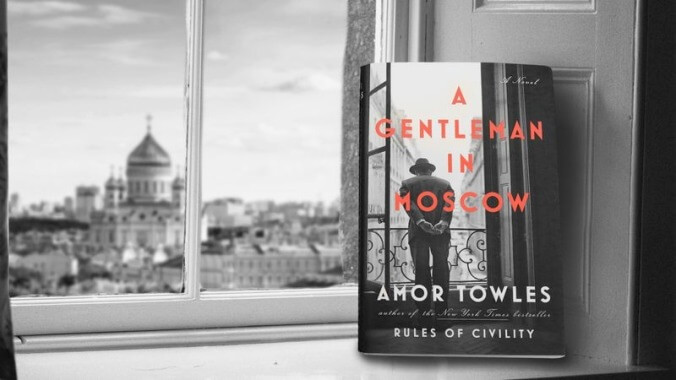Leo Tolstoy and Fyodor Dostoyevsky remain the alpha and omega of modern fiction, with their major quartet—War And Peace, Anna Karenina, Crime And Punishment, The Brothers Karamazov—epitomizing the major categories of the form. Theirs are the quintessential examples of historical fiction, character study, and psychological realism, and to a certain extent, every novel written since is in some way indebted to them. (Anton Chekhov and Nikolai Gogol hold similar stations on the short-story side.)
Despite that, few modern authors have taken them as direct inspiration. A great deal of literary fiction features a cross-section of society interacting against a backdrop of turbulent historic change—the basic template of War And Peace—but no one is writing a “Russian novel” as it is popularly viewed. Until now, at least.
Amor Towles’ A Gentleman In Moscow is an epic writ small, a story of Tolstoyan scope on a minute scale. Here we see a country in repeated upheaval over the course of decades—from the end of Imperial Russia in the Bolshevik Revolution past the rise of the USSR, a period that includes the defeat of one of history’s greatest evils by a country that becomes another—and we see it all from one man’s limited viewpoint.
The gentleman of the title is Alexander Rostov, a distinguished count and “unrepentant aristocrat” who in 1922 is punished for his political poetry (and history of dueling) with a life sentence of house arrest in Moscow’s Metropol Hotel. Like the hero of Pete Hamill’s Forever, a man who is immortal so long as he stays on the island of Manhattan, the Count is an imprisoned witness to history, adjacent to the action but not a participant. From his window, mere steps from the Kremlin, he watches for more than 30 years as the world he was born into is banished, forgotten, dies off. But still he abides by the rituals of the old elite, a code of conduct he has internalized and believes to his very core. When Rostov dines with a Soviet colonel, he outlines the mosaic of reasons why the officer is not a gentleman: “As a host, it was perfectly appropriate for you to take up the serving tools. But a gentleman would have served his guest before he served himself.” Gentleman is the most persuasively affectionate depiction of the aristocracy since The Leopard.
The Count is principally seen through his relationship with women—a girl who is a fellow hotel resident and becomes an unexpected friend and pupil; a once-glamorous star of silent-era cinema reduced to sleeping with directors for bit parts in propaganda films; and a third whose story is best discovered on its own. The closest thing Gentleman has to a love story is a minor subplot, presented with all the tact one expects from the era, but to a certain audience, this will be a wildly romantic read. There’s something thrilling in the Count’s sense of honor, which necessitates choices he would not otherwise make. Many will want to climb into the book and live in the luxurious world that’s been recalled.
Part of this drama is inherent in the setting, but much comes from Towles’ light touch and eye for elegant details. Fans of Rules Of Civility—his previous book, also excellent—may remember its delightful focus on food, in particular a bowl of consommé. The sense of taste is generally underutilized in literature, but here cuisine becomes a dominant motif and theme. Not only are pivotal alliances formed and broken in the Metropol’s restaurant, but the turbulence of Russian history is expressed through the food: An act of rebellion involves stealing contraband to make a bouillabaisse, while an act of censorship—unexpectedly revisited with startling power—revolves around a famous countryman’s preference for non-Soviet bread. The first state-issued hardship the Count suffers is when the wine cellar’s bottles are stripped of their labels, leaving the communist choice of anonymous red or anonymous white.
Throughout, Towles keeps things as effervescent as the bubbly his characters constantly quaff—an impressive accomplishment, given the book’s length and lack of overarching narrative. He finds wit in the USSR’s bureaucracy, as when Stalin decrees that the country is at risk of acting too dour or looking too staid in its fashion, and thus mandates a return of Christmas festivities and chic, non-peasant clothing. (And in the sequence with the wine, it’s stressed that the vintages are delicious; the Count merely runs the risk of an unideal pairing with his meal.) In the margins, Towles is playfully self-aware of “the Russian novel” as a genre; at one point, noting how the characters in such volumes are typically referred to by multiple names and titles, a footnote assures the reader that a just-introduced figure won’t be reappearing, so there’s no need to commit his various decorations to memory.
Some may find this treatment flippant, especially given how much the historical aspects of the book are backgrounded; there’s less detail on World War II than you’d expect, for example. But a key to Towles’ purpose can be found in an offhand thought the Count has when informed of a suspicious figure in the lobby: “It was just the sort of colorful incident that an international hotel should aspire to have as part of its lore.” A Gentleman In Moscow is full of that kind of lore—of the stories and drama and elegance that far-off, long-ago European capitals have always suggested. To have that unspool against a massive backdrop of sweeping emotions, well, it just affirms what Tolstoy proved: Some things never go out of style.
Purchasing A Gentleman In Moscow via Amazon helps support The A.V. Club.

